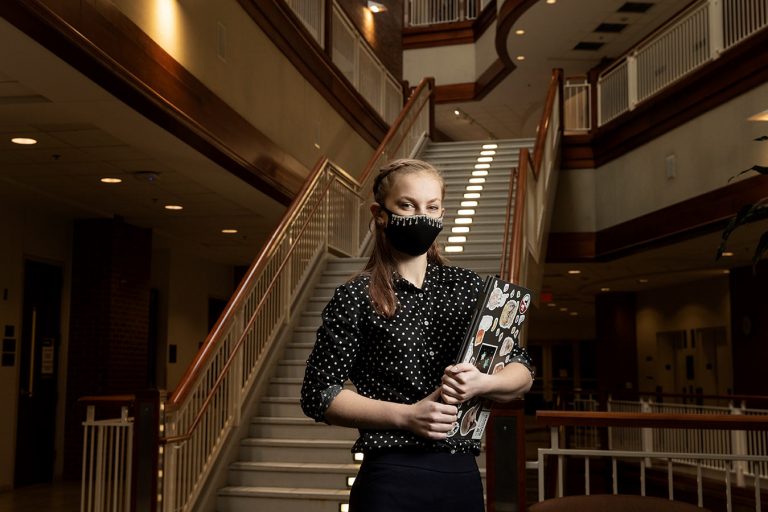Rewarding practice

By Feiyu Su
Ashley Chambers always arrived at Gwynn Hall on time for her 8 a.m. Western Music History class. She sat in the front where she could hear the professor clearly, opened a new Google Doc and named it with the date. She took notes carefully – typing every headline in bold, using bullet points, writing complete sentences and avoiding abbreviations.
The meticulous notes weren’t just for herself, however. Chambers is one of hundreds of students who provide copies of their notes to other students who have a notetaking accommodation through the Disability Center.
“It feels good knowing that I’m learning, and I’m also helping other people to learn,” Chambers said.
When her class moved online last spring, Chambers found it easier to take notes because the professor usually provided the recorded lecture on Canvas. But she still worked hard to make the notes as clear as possible.
The notetaking had an additional, unexpected benefit. “It just makes me pay more attention in class,” said the junior accounting major. “It gives me more motivation to take better notes.”
More than 600 classes have requested notetakers this semester for various reasons. One student’s disability, for example, might prevent them from paying full attention during class, said Disability Center exams coordinator Stacy Sarabia. Another student might be unable to take notes due to an injury.
Notetakers are responsible for taking legible notes and uploading them to an online system within 48 hours of the class. At the end of the semester, a notetaker can receive a stipend of $75 for one class and $100 for two or more classes.
“It’s something easy that you can do. It’s not really taking any additional time out of your day to help somebody,” said Carly Bailey, a senior student majoring in health science. “If you’re doing it anyway, why not give back a little bit?”
Bailey works harder when she takes notes for others. “Whenever I’m taking notes for a class that I know I’m going to upload, I’m more conscious about it,” she said. “Making sure that you’re writing neatly and you’re writing dark enough that when you scan it, they will actually be able to read it.”
Bailey said that being a notetaker helps her to be more accountable and detail-oriented. It helps with her attendance rates and makes her a more meticulous notetaker.
The service aspect of the job could even be a resume booster, Bailey said.
“It shows that you took the extra time and did a little bit of extra work to help somebody,” Bailey said.